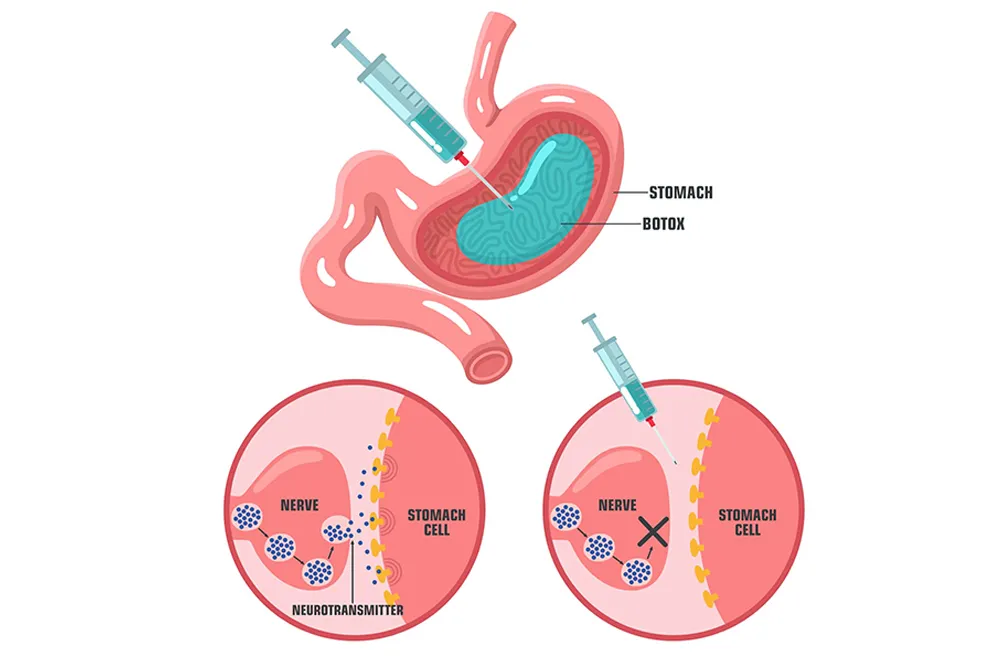Gastric Botox is emerging as a procedure for those seeking a helping hand with their weight management journey. It’s a non-surgical intervention that aims to curb your appetite from the inside out. But how does getting stomach botox injections actually work, and is it the right choice for you? This guide breaks down the science, the procedure, and the realistic expectations to help you make an informed decision.
What is Gastric Botox
Gastric Botox, also known as Stomach Botox for weight loss, is a medical procedure that has gained attention in recent years as a potential solution for those struggling with obesity. This procedure involves injecting Botulinum toxin into the muscles of the stomach, aiming to reduce appetite and promote weight loss. Despite its growing popularity, research on gastric Botox is limited, and the risks and success rates of the procedure are not yet fully understood.
How Does Gastric Botox Work?
Botox is a neurotoxin that works by blocking signals sent from nerves to muscles, resulting in reduced muscle activity. When injected into the stomach muscles, Botox is thought to slow down the rate at which food is emptied from the stomach into the small intestine. This process can lead to a feeling of fullness and reduced appetite, which might help with weight loss.
What Happens During a Gastric Botox Injection?
Understanding the process can help ease any nerves. The gastric Botox injection is a straightforward, day-case procedure that typically takes around 15-20 minutes.
- You’ll be placed under light sedation to ensure you’re comfortable and relaxed.
- A gastroenterologist will pass a thin, flexible tube (an endoscope) through your mouth and down into your stomach.
- Using a special needle passed through the endoscope, the doctor will administer multiple small injections of Botox into the lining of your stomach, focusing on the pyloric region.
- After a short recovery period in the clinic, you can go home the same day. You might feel a bit groggy from the sedation, so you’ll need someone to drive you.
Potential Benefits of Gastric Botox
While the idea of gastric Botox as a weight loss treatment may sound promising, it is crucial to understand the potential benefits clearly. These include:
- Reduced Appetite: By slowing down stomach emptying, stomach Botox can help reduce feelings of hunger.
- Non-Surgical: Gastric Botox is a minimally invasive procedure that does not envolve incisions, scars, and lengthy recovery time associated with surgery
Risks and Side Effects of Gastric Botox
The use of Botox for weight loss is not without its risks. Some of the potential side effects include:
- Nausea and Vomiting: Common side effects post-procedure.
- Abdominal Pain: Patients might experience discomfort in the stomach area.
- Diarrhea: Gastrointestinal disturbances can occur.
- Muscle Weakness: There’s a risk of Botox spreading to other parts of the body, causing muscle weakness.
- Difficulty Swallowing and Breathing Problems: In rare cases, Botox can affect muscles involved in swallowing and breathing.
Limited Research and Mixed Results
Research on gastric Botox as a weight loss treatment is still very limited, and the available studies have shown mixed results. Here are some key findings:
- 2014 Study in Gastroenterology Research and Practice: This study found that gastric Botox led to modest weight loss in obese patients over six months. However, the weight loss was not sustained, and participants regained most of the weight within a year.
- 2018 Study in Obesity Surgery: This study involving 75 participants found that gastric Botox was no more effective than a placebo injection in promoting weight loss. Both groups followed the same diet and exercise regimen, with no significant difference in weight loss between the Botox and placebo groups.
- 2019 Study in Obesity: This study followed 60 patients who underwent gastric Botox injections and found that only 20% lost more than 5% of their body weight. Furthermore, most of the patients regained the weight they had lost within a year.
- 2023 overview of systematic reviews: This overview concluded that gastric botox injection provide only modest and inconsistent weight loss. The authors noted that while the procedure is generally safe, its effectiveness as a standalone obesity treatment remains uncertain and limited, and should be considered with caution in clinical practice.
What Is the Cost of Gastric Botox
In addition to the risks and limited success rates, the cost of stomach Botox is a significant factor. According to the American Society for Metabolic and Bariatric Surgery, the cost can range from €1,000 to €2,000 per treatment. Since multiple treatments are usually required, the long-term cost can be unsustainable for many patients considering this as an alternative to surgery.
Who Is a Candidate for Gastric Botox?
This procedure isn’t for everyone. You might be a candidate if you:
- Have a BMI between 27 and 35.
- Have struggled with yo-yo dieting and need help with portion control.
- Are looking for a non-surgical kickstart to a healthier lifestyle.
- Understand that results are not guaranteed and may be modest.
- Do not have certain pre-existing digestive conditions, like gastroparesis.
Stomach botox is generally not recommended for individuals with a higher BMI who need significant, long-lasting weight loss results.
Alternatives Options to Gastric Botox
Given the limited success rates and potential risks, it’s important to consider other weight loss procedures that have shown to be more effective, such as:
Non-Surgical Options:
- Allurion Gastric Balloon: A temporary, non-surgical balloon that occupies space in your stomach for about 16 weeks, providing a powerful tool for portion control and habit formation.
- Ozempic Injections: These weekly injections work hormonally to suppress appetite and slow stomach emptying, often with more significant and consistent results than stomach Botox.
See how these two options compare in our Ozempic vs Gastric Balloon guide.
Surgical Options (for significant, long-term weight loss):
- Gastric Sleeve: A procedure that permanently removes a portion of the stomach, reducing its size and hunger-stimulating hormones.
- Gastric Bypass: A more complex surgery that both restricts stomach size and reroutes the digestive system, leading to significant weight loss and metabolic changes.
Learn how weight-loss surgery compares with Ozempic injections.
Frequently Asked Questions (FAQ)
Results vary widely, but most studies show an average loss of 5-15% of your excess body weight over 4-6 months. It is not a solution for massive weight loss.
Currently, Stomach Botox is not officially approved by regulatory bodies like the FDA or EMA specifically for weight loss. Its use is “off-label,” meaning doctors can use it based on their clinical judgment.
The effects are temporary, typically lasting between 4 to 6 months. After this, the stomach muscles return to their normal function, and appetite returns.
The cost typically ranges between $1,000 and $2,000 per treatment session. It’s important to note that since the effects are temporary, this cost may recur every 4-6 months if you choose to repeat the procedure, making it potentially more expensive long-term than some permanent solutions.
The biggest risk specific to gastric Botox is the potential spread of the toxin beyond the injection site, which could lead to muscle weakness in nearby areas
The main disadvantages include temporary results (lasting 4-6 months), highly variable and often modest weight loss outcomes, and the potential need for repeated treatments. Unlike more established procedures, its effectiveness isn’t consistently proven in clinical studies, and it may not provide significant enough results for those with substantial weight to lose.
Conclusion
While gastric Botox may sound like a promising solution for those struggling with obesity, the limited research and mixed results suggest that it is not a reliable long-term weight loss treatment. Individuals considering the procedure should fully understand the potential benefits and drawbacks before making a decision.
If you’re exploring weight loss options and aren’t sure which procedure is right for you, book a free consultation with our expert bariatric team. We’ll review your health, goals, and lifestyle and guide you toward the safest and most effective treatment for you.






